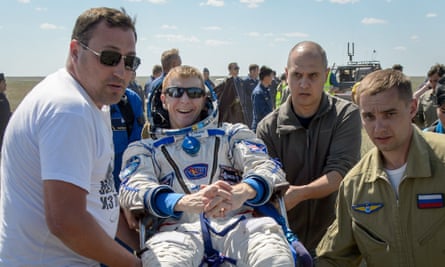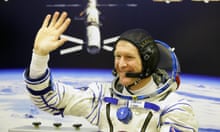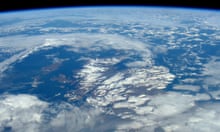British astronaut Tim Peake is experiencing the “world’s worst hangover” after spending six months in space.
Now back on Earth at the European Astronaut Centre in Cologne, Germany, he faces three weeks of rehabilitation during which he will undergo a barrage of medical tests and maintain a strict exercise regime.
Doctors will draw blood, conduct Magnetic Resonance Imaging (MRI) scans, and question Peake to improve their understanding of the physical and psychological effects of space travel.
The astronaut will also be examined on a tilt table that can rotate his body from a horizontal to a vertical position to monitor how his heart and blood circulation are responding to gravity.
It will take Peake a few days to learn to walk again. Soon after landing in Kazakhstan on Saturday he could be seen making his first attempts at walking in Earth’s gravity supported by two helpers.
Sense of balance is also greatly affected by the transition away from an environment where there is no “up” or “down” as defined by gravity.
On Earth, the vestibular system in the inner ear that keeps us on our feet can be over-stimulated. Dizziness and nausea are common problems experienced by astronauts returning from orbit, as are feelings of faintness caused by a drop in blood pressure.
After arriving in Cologne, Peake said he was experiencing dizziness and vertigo every time he moved his head. Such effects normally disappear very quickly; others could take much longer to recover from and some may cause permanent changes.

Months in space will have weakened Peake’s muscles and bones and temporarily shrunk the size of his heart. Astronauts lose up to 1.5% of their bone mass for each month spent in space. The loss is greatest in the upper thighs and pelvis, and can increase the risk of injuries such as hip fractures.
Over time, the influence of gravity helps the bone regrow, but full recovery can take as long as three years depending on the individual. Muscles get stronger quickly, but the weakness can be deceptive to begin with and astronauts have reported straining their necks by turning their heads too quickly.
While in space, unprotected by the Earth’s magnetic field, Peake will have been exposed to a radiation dose equivalent to about 1,200 chest x-rays. That is enough to increase his risk of cancer, but not by more than about 3%.
Peake and his crewmates – American Nasa astronaut Colonel Tim Kopra and Russian cosmonaut Yuri Malenchenko – made the trip back to Earth on Saturday in a tiny Soyuz descent module measuring just over 6ft (1.8 metres) across.
Two other elements of their Soyuz TMA-19M spacecraft – the orbital module providing extra living accommodation while in orbit, and the service module housing propulsion and control systems – were allowed to burn up in the Earth’s atmosphere.
As they plunged through the atmosphere, friction on the craft’s forward-facing heat shield slowed its speed from 17,398mph (28,000kph) to 514mph (827kph) and raised the temperature to 1,600C.
The capsule parachuted down to a remote spot on the vast scrubland of the Kazakhstan steppe. A second before touch down, a burst of fire from six retro rockets reduced the impact speed to 3mph.
Peake was the second crew member to be lifted out of the capsule, which was rolled on to its side after landing by a gust of wind. He described the journey as “incredible – the best ride I’ve been on ever” and said he was tempted to celebrate his arrival home with pizza and a cold beer.
On Sunday, Peake flew in to Cologne where he was greeted with a hug from his mother, Angela. His father, Nigel, was also there to meet him. He said: “It’s a job well done, I’m so proud of him and what he’s achieved.”
On Tuesday, Peake will give his first press conference since arriving back on Earth at the European Astronaut Centre, the European Space Agency’s astronaut base.









Comments (…)
Sign in or create your Guardian account to join the discussion